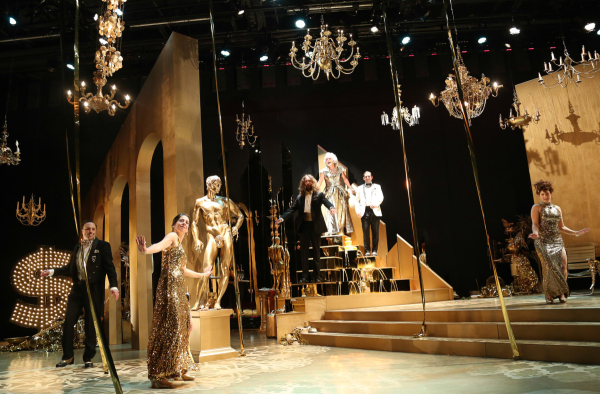Stop Hitting Yourself

(© Erin Baiano)
Is charity just an excuse for rich people to throw a big party? In his 1891 essay, The Soul of Man Under Socialism, Oscar Wilde argued that charity, however well-intentioned, has the adverse effect of perpetuating poverty by reinforcing a system of private property, in which a select few wealthy individuals are in a position to offer handouts to the masses, often based on whim. He wrote, “It is immoral to use private property in order to alleviate the horrible evils that result from the institution of private property.” Not coincidentally, the Austin-based Rude Mechs have set their latest devised piece, Stop Hitting Yourself, at a lavish charity ball. It is now making its New York premiere at LCT3’s Claire Tow Theater. This playful and engrossing exploration of wealth, charity, poverty, and human nature is sure to tap-dance through the corridors of your brain for weeks to come.
The Rude Mechs were heavily inspired by Ayn Rand’s novel Anthem, which was recently tackled by another Austin theater company. Rather than a straightforward presentation of Rand’s story (which is just a platform for her philosophy), Stop Hitting Yourself gets to the heart of that philosophy of rugged individualism and asks why inequality exists in the first place. Is wealth really always the result of hard work and self-denial?
And what could be a better setup for that discussion than the opening image of the play: a dead hobo in the middle of a glittering palace. Set designer Mimi Lien has removed the regular proscenium of the Claire Tow, revealing a sprawling stage littered with wealth. There’s a gaudy golden statue of David, a gold-plated baby grand piano, and a three-tiered queso fountain. This is what the inside of Donald Trump’s brain looks like. Emily Rebholz has costumed the inhabitants of this Twilight Zone of excess like Williamsburg hipsters at a “Swingin’ ’50s” theme party. They tap-dance across the stage in preparation for the annual charity ball held by the Queen (Paul Soileau), a fabulously wealthy and powerful woman in a Nancy Reagan suit. Cruel and manipulative, she wheels around the set in her gilded jazzy like Auntie Mame’s evil stepsister.
Our narrator is a Wildman of the forest (Thomas Graves), a scruffy human Lorax who has been invited to the ball by the Socialite (Lana Lesley). The ball is like Davos, a yearly meeting of the richest and most powerful people in the land. It attracts guests like the Magnate (E. Jason Liebrecht) and the Trust Fund Sister (Hannah Kenah) and it’s mostly just an excuse for these people to get drunk and eat queso dip for two weeks. At the culmination of the event, the Queen holds a competition and grants the winner one wish. The Wildman intends to ask the Queen to preserve the forest, but he’ll have to get through the Unknown Price (Joey Hood) first: He’s a charismatic and sly Rick Santorum lookalike who doesn’t give a crap about the forest and wants to be restored to his place as royalty.
The seemingly reductive character names betray a deeply nuanced play: Rather than an agitprop screed against neoliberal capitalism (or worse, an apologetic for its excesses), Stop Hitting Yourself is a probing look at the human impulses that lead to inequality, and how those impulses live within all of us. No one in this play is free from scrutiny, including the Mechs themselves: At one point Graves moves around the stage pointing to various set pieces and explaining how much they cost to bring from Texas and where that money came from (apparently a grant they won for promising to create a “permanent good” for the community in Austin, Texas; they’re in Manhattan instead). Could anything be more excessively wasteful than the theater?
All this is delivered with athletic rigor by an ensemble of performers capable of switching in an instant from high burlesque to honest sincerity. Several confessional moments, in which the actors break character and directly address the audience about their own wasteful habits and selfish impulses, help ground this fantastical tale in the real world. There is no fourth wall here, nor is there any condescending impenetrability. This is thought-provoking and accessible experimental theater that grabs hold of its subject and doesn’t let go. You’ll be thinking about this one for a long time.











